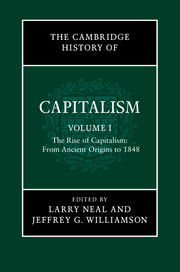110 results
15 - Convergence of Philippine Spatial Inequality during the American Colonial Period
-
-
- Book:
- Pro-poor Development Policies
- Published by:
- ISEAS–Yusof Ishak Institute
- Published online:
- 09 January 2024
- Print publication:
- 10 June 2022, pp 390-413
-
- Chapter
- Export citation
Reviews
-
- Book:
- The Cambridge History of Capitalism
- Published online:
- 05 March 2014
- Print publication:
- 23 January 2014, pp ii-ii
-
- Chapter
- Export citation
Tables
-
- Book:
- The Cambridge History of Capitalism
- Published online:
- 05 March 2014
- Print publication:
- 23 January 2014, pp viii-viii
-
- Chapter
- Export citation
Reviews
-
- Book:
- The Cambridge History of Capitalism
- Published online:
- 05 March 2014
- Print publication:
- 23 January 2014, pp ii-ii
-
- Chapter
- Export citation
Maps
-
- Book:
- The Cambridge History of Capitalism
- Published online:
- 05 March 2014
- Print publication:
- 23 January 2014, pp ix-ix
-
- Chapter
- Export citation
Copyright page
-
- Book:
- The Cambridge History of Capitalism
- Published online:
- 05 March 2014
- Print publication:
- 23 January 2014, pp iv-iv
-
- Chapter
- Export citation
1 - Introduction:
-
-
- Book:
- The Cambridge History of Capitalism
- Published online:
- 05 March 2014
- Print publication:
- 23 January 2014, pp 1-21
-
- Chapter
- Export citation
16 - The futureof capitalism
-
-
- Book:
- The Cambridge History of Capitalism
- Published online:
- 05 March 2014
- Print publication:
- 23 January 2014, pp 530-546
-
- Chapter
- Export citation
The Cambridge History of Capitalism - Title page
-
-
- Book:
- The Cambridge History of Capitalism
- Published online:
- 05 March 2014
- Print publication:
- 23 January 2014, pp iii-iii
-
- Chapter
- Export citation
Index
-
- Book:
- The Cambridge History of Capitalism
- Published online:
- 05 March 2014
- Print publication:
- 23 January 2014, pp 547-567
-
- Chapter
- Export citation
The Cambridge History of Capitalism - Half title page
-
- Book:
- The Cambridge History of Capitalism
- Published online:
- 05 March 2014
- Print publication:
- 23 January 2014, pp i-i
-
- Chapter
- Export citation
Contributors
-
-
- Book:
- The Cambridge History of Capitalism
- Published online:
- 05 March 2014
- Print publication:
- 23 January 2014, pp xi-xii
-
- Chapter
- Export citation

The Cambridge History of Capitalism
-
- Published online:
- 05 March 2014
- Print publication:
- 23 January 2014
Contributors
-
-
- Book:
- The Cambridge History of Capitalism
- Published online:
- 05 March 2014
- Print publication:
- 23 January 2014, pp ix-x
-
- Chapter
- Export citation
The Cambridge History of Capitalism - Half title page
-
- Book:
- The Cambridge History of Capitalism
- Published online:
- 05 March 2014
- Print publication:
- 23 January 2014, pp i-i
-
- Chapter
- Export citation
Figures
-
- Book:
- The Cambridge History of Capitalism
- Published online:
- 05 March 2014
- Print publication:
- 23 January 2014, pp vii-viii
-
- Chapter
- Export citation
Copyright page
-
- Book:
- The Cambridge History of Capitalism
- Published online:
- 05 March 2014
- Print publication:
- 23 January 2014, pp iv-iv
-
- Chapter
- Export citation
Contents
-
- Book:
- The Cambridge History of Capitalism
- Published online:
- 05 March 2014
- Print publication:
- 23 January 2014, pp v-vi
-
- Chapter
- Export citation
The Cambridge History of Capitalism - Title page
-
-
- Book:
- The Cambridge History of Capitalism
- Published online:
- 05 March 2014
- Print publication:
- 23 January 2014, pp iii-iii
-
- Chapter
- Export citation
Contents
-
- Book:
- The Cambridge History of Capitalism
- Published online:
- 05 March 2014
- Print publication:
- 23 January 2014, pp v-vi
-
- Chapter
- Export citation



